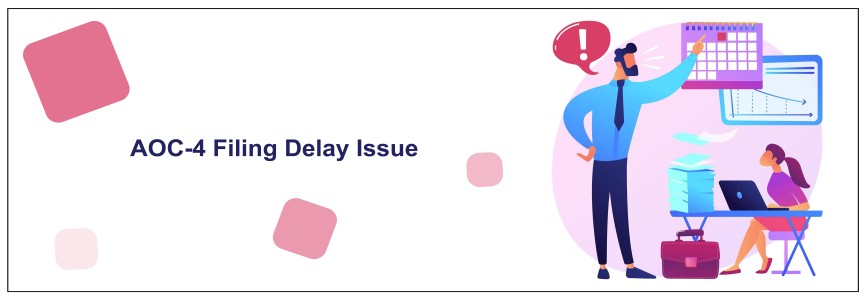Penalty for Default in Filing Financial Statements (AOC-4) under Section 137 of the Companies Act, 2013
The Companies Act,2013 mandates strict disclosure and filing requirements to ensure corporate accountability, transperancy, and protection of stakeholders. Section 137 deals specifically with filing of financial statements with the Registrar Of Companies. Non compliance with this provision is treated as a serious lapse, attracting penalities both on the company and its officers.
In this present case, the company filed form AOC-4 for the financial year 2014-15but omitted to attach the profit and loss statement, thereby rendering the filing incomplete. This omission amounted to a violation of section 137(1). The matter was taken up for adjudication under section 137(3), which prescribes penalities for failure to file financial statements. During the proceedings, the company submitted that the default was unintentional and was subsequently rectified in FY-2015-16. A hearing was granted on 11.06.2025 todetrmine the liability of the company and its officers. The case highlights the regulatory approach towards procedural defaults in statutory filings and the consequences thereof.
Facts and Background of the Case
As per section 137(1) A copy of the financial statements, including consolidated financial statement if any, along with all the documents which are required to be or attached to such financial statements under this act, duly adopted at the annual general meeting of the company, shall be filed with the registrar within the thirty days of the date of annual general meeting in such manner, with such fees or additional fees as may be prescribed. However the United Techfab Limited had not attached the profit and loss statement with AOC-4 for the financial year 2014-15 which contravened section 137(1) of the companies act. The company has stated in adjudication application that they attach financial statement along with balance sheet and profit and loss account with effect fron financial year 2015-16. Thus the default was made good during the financial year 2015-16.
Issues
-
The filing of AOC-4 for FY-14-15 without attaching the statement of profit and loss constitutes a contravention of section 137(1) of the companies act 2013.
-
Such omission amounts to failure to file the financial statements within the meaning of the section 137(1) thereby attracting penalty under section 137(3).
-
Officers in default are liable under section 137(3) considering the presence or absence of a managing director, CFO or Board designated compliance director during the relevant period.
Penalty
-
United Techfab Limited and its Key Managerial Personnel failed to comply with certain statutory provision under the Companies Act, 2013.
-
A Suo- Moto application was filed by the company and its officers acknowledging the default.
-
The Adjudicating officer considered the submissions and imposed penalty as per law.
-
The Adjudicating Officer held the company and its officers liable for non-compliance
-
Considering the suo-moto application no additional penalty was imposed
-
Penalities were levied within the maximum statutory limits prescribed.
United Techfab Limited- 83100
Kamalkishore Purshotamdas Hada- 50000
Gagan Nirmalkumar Mittal- 50000
Nirmalkumar Mangalchand Mittal- 50000
Ritesh Kamalkishore Hada- 50000
Payment of Penalty
-
The Adjudicating Officer finds the company and its officer guilty of the violation of provisions of this act.
-
The penalty must be paid within 90 days through MCA e- Adjudication portal.
-
The penalty must be paid within 90 days through MCA e- Adjudication portal.
-
The officers are required to pay the penalty from their personal funds.
-
Under section 454(5) and (6) the regional director, Ahemdabad has the right to appeal within 60 days.
Final Note of the Article
The violation of Section 137(1) of the Companies Act, 2013 reflects a fundamental breach of statutory responsibility relating to the filing of financial statements. The provision is a cornerstone of corporate regulation, as it ensures that the financial affairs of companies are made accessible to regulators, creditors, investors, and the public at large. Timely filing not only promotes transparency and good governance but also helps maintain the integrity of the corporate reporting system.
Failure to comply with this obligation is not treated as a mere technical lapse but as a substantive default, since concealment or delay in disclosure of financial statements undermines public trust and the regulatory framework envisaged under the Act. Accordingly, the imposition of penalties on both the company and its officers in default serves a dual purpose: it acts as a deterrent against future lapses and reaffirms the accountability of corporate management in discharging statutory duties.
This case highlights that statutory compliance cannot be taken casually, and suo-motu applications or remedial actions after default may mitigate, but cannot absolve liability. The adjudicatory process emphasizes the legislative intent to enforce strict adherence to timelines, reflecting a broader shift in corporate law towards stricter compliance and enforcement mechanisms.
Therefore, the case reinforces the principle that adherence to Section 137(1) is indispensable for corporate transparency and accountability, and its violation invites inevitable penal consequences, thereby safeguarding the overall objectives of the Companies Act, 2013.











































































_crop10_thumb.jpg)


































































_crop10_thumb.jpg)
_crop10_thumb.jpg)



_crop10_thumb.jpg)


_crop10_thumb.jpg)





_crop10_thumb.jpg)

_crop10_thumb.jpg)














-suratgujarat-section-158_crop10_thumb.jpg)
-suratgujarat_crop10_thumb.jpg)
-(33)_crop10_thumb.jpg)



-ahmedabad_crop10_thumb.jpg)
-learn_crop10_thumb.jpg)

-learnn_crop10_thumb.jpg)



























































_crop10_thumb.jpg)























_Guidelines_learn_crop10_thumb.jpg)























_learn_crop10_thumb.jpg)
_crop10_thumb.jpeg)










_crop10_thumb.jpg)




_Second_Amendment_Rules,_2025_learn_crop10_thumb.jpg)







_learn_crop10_thumb.jpg)












































_learn_crop10_thumb.jpeg)























_learn_crop10_thumb.jpg)



_rd_roc_learn_crop10_thumb.jpg)















_learn_crop10_thumb.jpg)














_learn_crop10_thumb.jpg)
_Learn_crop10_thumb.jpg)











































_learn_crop10_thumb.jpg)




_learn_crop10_thumb.jpg)













_crop10_thumb.jpeg)















